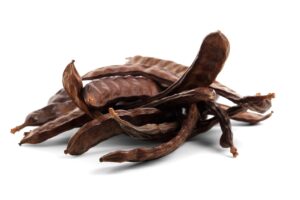- Course: Dessert

Carob

The carob tree, Ceratonia siliqua, produces dark brown pea pod-like fruit that contains pulp and seeds. Carob is a tasty and healthful chocolate replacement. It has been used for health purposes for over 4,000 years, dating back to ancient Greece.
According to the “Encyclopedia of Healing Foods,” carob pods were offered to vocalists by 19th-century British chemists. Carob pods were chewed by singers to keep their vocal cords healthy and to calm and cleanse their throats.

Carob is available to buy as:
- Powder
- Chips
- Syrup
- Extract
- Dietary pills
Carob pods are edible whether they are fresh or dried. People who incorporate carob into their diet report weight loss and fewer stomach troubles. The anti-inflammatory and antioxidant qualities of carob’s active ingredients, such as polyphenols, tannins, dietary fiber, and sugars, have been found to be notably useful to the gastrointestinal tract and digestive system.
Carob Treats
If consuming chocolate is also problematic for you, consider trying carob. Carob is a wonderful chocolate alternative. It’s made from dried, roasted carob tree pods and the powder looks a lot like cacao powder.
Ingredients
- 1 cup Carob chips
- 1 cup Almond or Peanut Butter
- 1 tsp. Maple Syrup
- 1 cup Granola or Cereal
- 1/2 cup Shredded Coconut
Instructions
- Spread peanut butter around the bottom of a glass dish. Set the bowl on a double boiler or place it in a microwave oven for 1 1/2 minutes or until the peanut butter is soft and hot. Pour carob chips in the middle, and stir until the carob has melted totally. Add coconut, sweetener, granola, and walnuts. Mix well. Line the baking sheet with wax or parchment paper and drop spoonfuls onto the paper. Refrigerate. Serve when hard.

Notes
Why eat carob?
Many health benefits can be obtained by including carob in your diet. Carob is great for persons with high blood pressure because it is naturally high in fiber and has no caffeine. It’s also an excellent dietary addition or chocolate substitute for folks trying to lose weight because of its low sugar and fat content. High vitamin levels, such as vitamins A and B-2, are beneficial to skin and eye health.
Including or replacing carob in your diet can help:
- Cholesterol reduction
- Lower your chances of developing heart disease
- Stomach discomfort
- Diarrhea treatment
Carob, like cocoa, contains polyphenols, and antioxidants that have been shown to lower the risk of heart disease.
Carob for digestive issues
If you have digestive problems, you should consider consuming carob. Carob tannins differ from typical plant tannins, which are nutritional components found in plants. Carob’s tannins do not dissolve in water and hence do not obstruct digestion. Instead, they have a drying impact on the intestines, which aids in the removal of toxins and the prevention of hazardous bacterial development.
Carob’s natural sugars also help to thicken loose stools. According to research, Carob bean juice appears to be a safe and efficient treatment for diarrhea in both children and adults. Before taking carob as a supplement, see your doctor.
Is carob healthy?
People frequently compare carob to chocolate due to their comparable flavors. It is, nonetheless, more nutritious than chocolate.
Carob
- Offers double the calcium of chocolate
- Is caffeine- and fat-free
- And is free of a migraine-causing chemical
Cocoa
- Contains oxalic acid, which blocks calcium absorption
- Can cause migraines in certain people
- Heavy in sodium and fat
Carob is also an excellent source of vitamins and minerals. Carob has vitamins:
- A
- B-2
- B-3
- B-6
It also has these minerals:
- copper
- calcium
- manganese
- potassium
- magnesium
- zinc
- selenium
Carob is also high in fiber, pectin, and protein.
Does carob have side effects?
Carob is considered to be a low-risk food. Carob has been approved for use in food, medicines, and cosmetics by the US Food and Drug Administration (FDA).
Although carob allergies are uncommon, one Spanish study indicated that patients with nut and legume allergies might be allergic to carob gum. Rashes, asthma, and hay fever were among the symptoms. However, persons who are allergic to peanuts were able to eat roasted carob seeds and carob gum without any problems, according to the study.
Carob is not subject to the same FDA regulations as other dietary supplements. Carob consumption is not recommended, especially for pregnant women. It may result in unwanted weight loss and blood sugar and insulin levels drop.
Ways to use carob
Try combining carob powder into your diet in the following ways:
- Smoothies with carob powder
- Carob powder can be sprinkled on yogurt or ice cream.
- Make your favorite bread dough or pancake batter with carob powder.
- Instead of hot chocolate, prepare a hot carob drink.
- Make a carob pudding with cream
- Carob bars made from carob powder and almond milk can be substituted for candy bars.
- Brownies with carob
Takeaway
Carob is an excellent alternative to chocolate, especially if your body has digestive or dietary issues, such as gluten intolerance. You can use the powder and chips the same way as you would chocolate in almost all recipes. And you can enjoy your favorite sweet treats with fewer calories, fat, and sugar.
The FDA has approved carob for consumption and as an additive in food, medications, and cosmetics. As an ingredient, you can purchase carob as gum, powder, or chips at most specialty or health food stores. As a supplement, it’s available in pill form at most pharmacies. It’s possible to have an allergic reaction to carob, but this is rare.

Leave a Reply